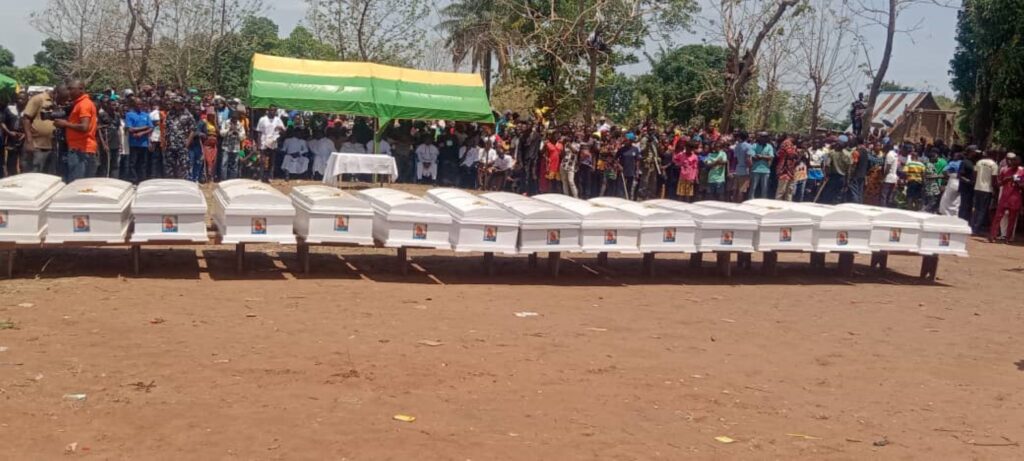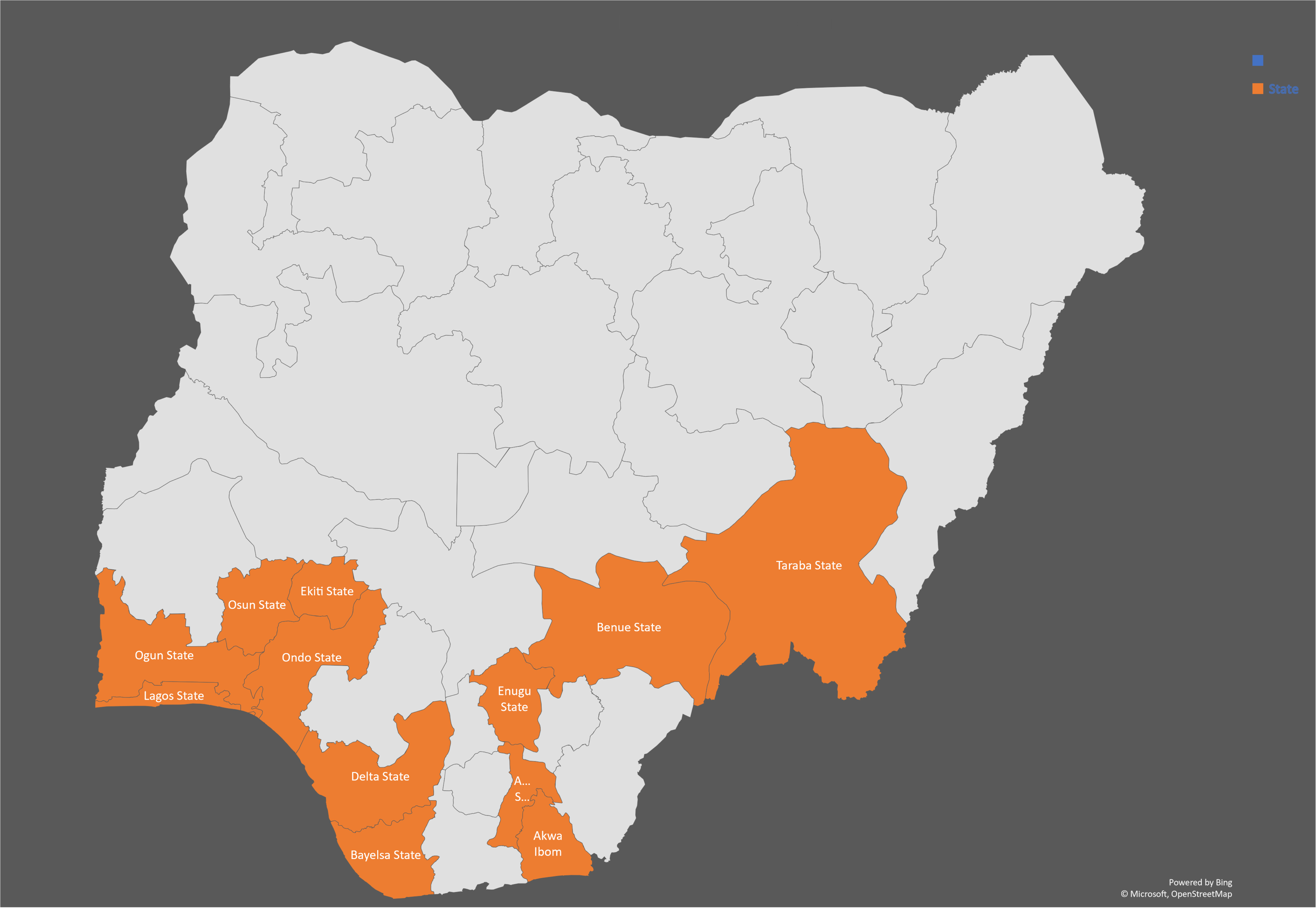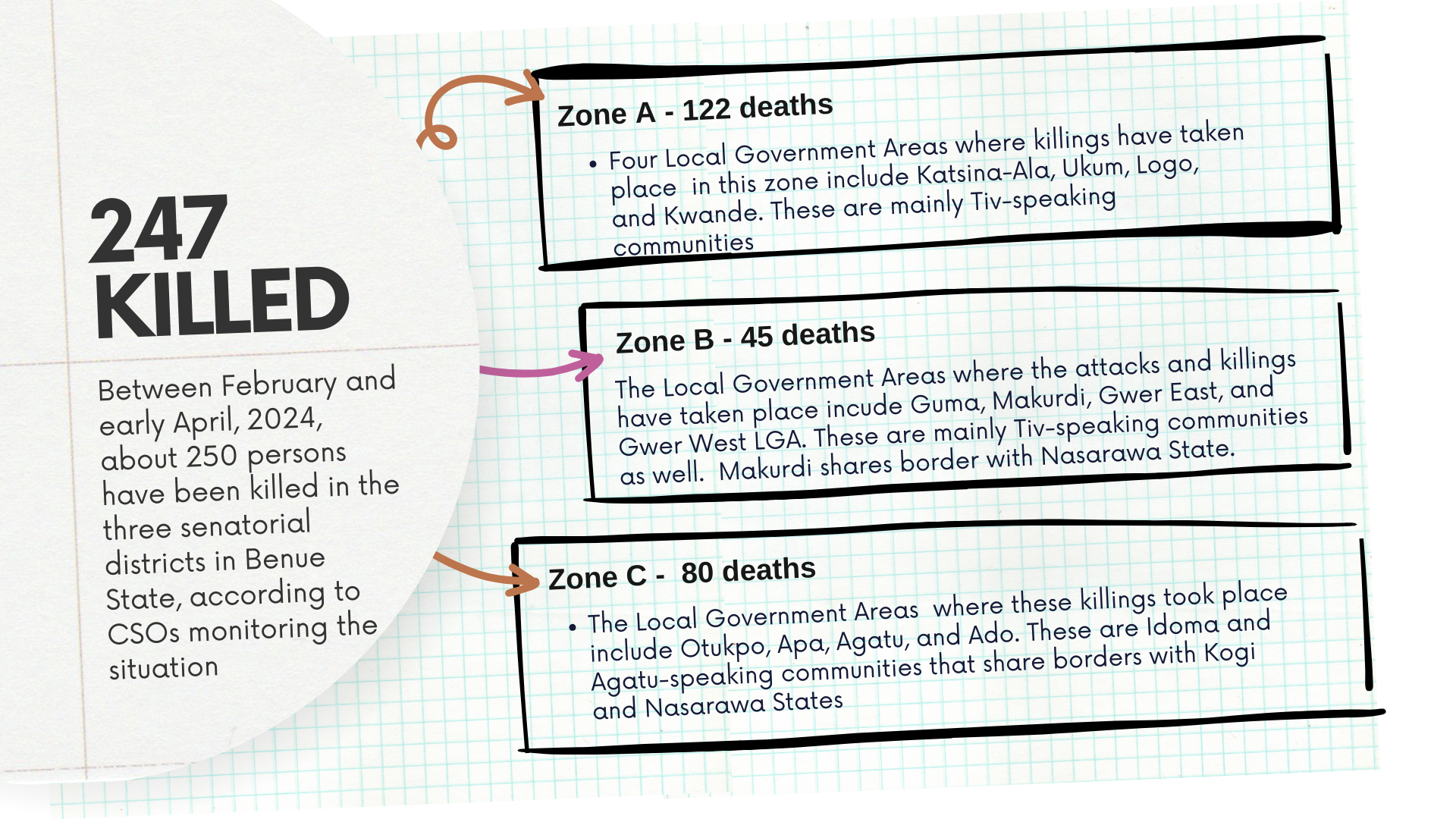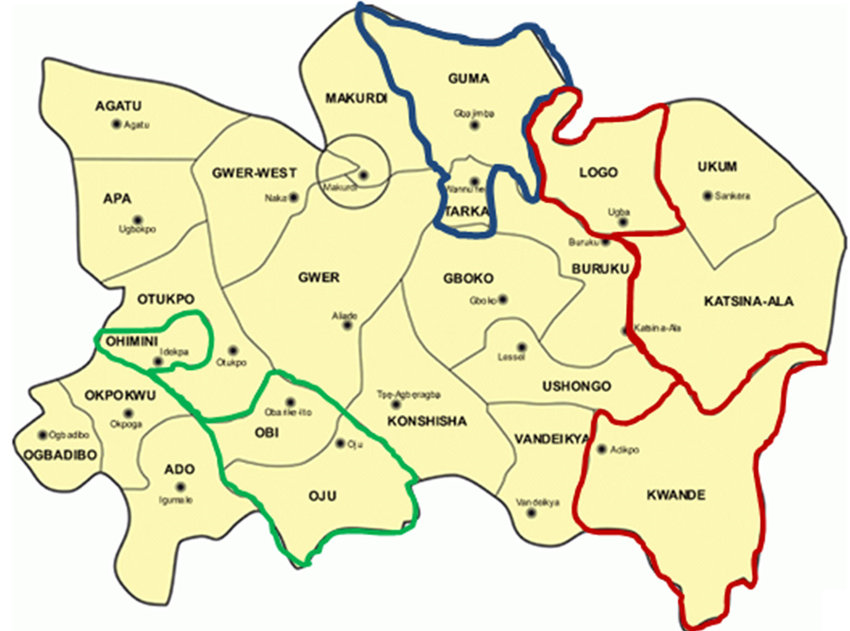Governor Alia’s ‘brothers in the bush’ unleash terror on Benue

Key points
-
About 250 killed between February and early April, 2024
-
12 Local Government Areas under siege
-
Ultimatum to foreign herders to leave fall on deaf ears
-
‘Governor does not visit victims’
-
‘Crisis can’t end until government comes up with a data-based economic policy’
-
He is doing his best – spokesman
By Charity Roberts
On Thursday, March 6, 2024, a retired Warrant Officer of the Nigerian Army, Mbatsavbun Gbatar, captured three Fulani herders whose cows trespassed into farms in Wandor community of Mbakyor in Mbatom District in Gwer East Local Government Area of Benue State. Gbatar arrested the herders in his capacity as the head of the vigilante in this community, in line with Benue State’s Open-Grazing Prohibition and Ranches Establishment Law, which outlaws open grazing by herders and imposes fines on violators. He handed the young herders over to the Nigeria Police in Aliade, the headquarters of Gwer-East LGA in Benue State.
ULTIMATUM TO ‘’FOREIGN HERDERS’ TO LEAVE FALL FLAT
Though Governor Hyacinth Alia suspended the anti-open grazing law enacted under his predecessor Samuel Ortom, the Catholic Reverend Father-turned-governor, revived it as a result of the mass killings perpetuated in the state by ‘foreign Fulani herders’. On February 21, 2024, the governor issued a two-week ultimatum to the herders to leave the state, and set up a10-man committee to enforce the revived anti-open grazing law. The deadline ended on Tuesday, March 6, 2024. The retired Warrant Officer, therefore, took hold of violators of the law and handed them over to the police.
Instead of the Nigeria Police to prosecute the lawbreakers, they rather released the three herders who broke the law under circumstances shrouded in confusion. On the night of Thursday, March 7, 2023, over 40 heavily armed bandits invaded Wandor community at about 7pm killing, maiming and burning every property in sight.
Instead of the Nigeria Police to prosecute the lawbreakers, they rather released the three herders who broke the law under circumstances shrouded in confusion
By the next morning, on Friday, March 8, the community had counted 16 corpses and over 40 houses burnt to ashes by the invaders, while family members were still searching the bush for their loved ones who were still missing. One of the victims in the attack was the retired Warrant Officer Mbatsavbun Gbatar who captured and handed over the violators of the anti-open grazing law to the police.
MASS BURIAL FOR VICTIMS
On Tuesday, April 9, 2024, 15 victims of the attack were given mass burial at Mbakyor. The Deputy Governor of Benue State, Barrister Samuel Ode, represented the governor at the burial, and told the people that all hand must be on deck to deal with the insecurity in the state.
The bloodshed in Wandor was not an isolated one. It was one in a series of bloodbath in Benue State since Governor Alia suspended the anti-open grazing law for a review in 2023.

The corpses of 15 victims of brutal attacks in Benue State being buried recently
The law, propounded in 2017, was to prevent bloody conflicts between farmers and herders over the invasion and destruction of farmlands by pastoralists. From 2017 to 2023, the enforcement of the law saw to the arrest and imposition of fines on herders who allowed their cattle to trespass into farms and private properties. To a great extent, the law reduced the bloody conflicts between farmers and herders in Benue State, though herders vehemently opposed it. At the political level, former Governor Samuel Ortom was alienated by the All-Progressives Congress (APC) government at the centre, and lost out in the 2023 political power game.
However, it was not only Benue State that enacted the anti-open grazing law. Other states like Ekiti, Edo, Taraba, Abia, Bayelsa, Ondo, Lagos, Delta, Enugu, Osun, and Akwa Ibom, have enacted implemented a similar law.

Map showing states in Nigeria that have enacted anti-open grazing laws
These states are from the North-Central to the South-West, South-South, and South-East parts of Nigeria, the savannah and rain-forest regions of Nigeria.
The herding of cattle from the North, the Sahel region, to the southern part of Nigeria during the dry season from December to April has always caused major conflicts in the North-Central region, especially.
It was not only Benue State that enacted the anti-open grazing law
ANGER OVER UNCONTROLLED BLOODBATH
The Reverend Father’s attempt to be politically-correct by departing from the anti-open grazing era of his predecessor, Chief Samuel Ortom, has brought back the years of bloodshed, pitting him against the majority farming communities who voted for him in the 2023 governorship elections.
The people’s anger is not unfounded. For instance, Oduda Oloche, was on Monday, March 4, 2024 macheted by armed herders who accosted her on her farm at Odejo Community in Agatu Local Government Area of Benue State. The young lady’s assailants thought she had died after they had inflicted a deep cut on her waist region. But she was later rescued by relatives and is currently battling for survival in the hospital.
Another farmer, Inalegwu Otache, a native of Opa community in Adoka district of Otukpo Local Government Area was killed on March 5, 2024 by armed herders who also used acid to disfigure the corpse.
A resident of Opa community who simply identified himself as Echoda, recounted the gruesome tactics employed by the armed herders as he detailed how they ruthlessly cut to pieces farmers who attempted to access their farms. Echoda said the armed ‘devils’ had been killing people in Opa and surrounding villages of Umogidi in Entekpa Council Ward of Adoka district in his Otukpo LGA of the state since February, 2024 when they invaded the area in large numbers.
He narrated the killings thus: “There was another attack just yesterday (recently) that claimed two people’s lives beside the previous day that a woman was butchered and two men who went to their farms to harvest yams were shot and killed. Most times, they killed their victims, then hid somewhere, waiting for relatives that would come for the corpses. They would shoot and kill such relatives or community members, too. People are being displaced from their villages and scattered all over Adoka, now looking for food; they can’t go to their homes in the affected villages to take food. The other day, my uncle went to take food from the deserted village to bring for his hungry family at Adoka main town, but he was shot dead. The situation is worrisome,” Echoda narrated.
Adakole and Edwin Aiakoko, other persons from other villages, corroborated these harrowing accounts, painting a stark picture of the terror gripping their communities. Two farmers were killed by armed herders in Udedeku community of Maav-Ya, Mkoonmom district of Mbaikyor Council Ward, Turan Jato-Aka in Kwande LGA of the state.
Both farmers went to fetch food in their respective farms for their starving families on a Sunday morning when the underworld men who had laid siege on their deserted communities caught them and hacked them into pieces.
The Caretaker Council Chairman of Kwande LGA, Reverend Father Mark Hule, confirmed the killings. His counterpart in Otukpo LGA, Alfred Oketa Omakwu, also confirmed the killing of rural farmers in his domain. Omakwu said the latest killing occurred in two communities: -Ipepe and Olakpoga . The victim went to farm to get some food for his family at the time the gunmen struck his already deserted community and he was killed.
Many more persons have been killed in different parts of the state in the past two months since the unprecedented influx of cattle and strange herders into the rural environs. The latest of the attacks took place in Adija, Apa LGA, where 18 persons were killed shortly before Easter in April 2024.
247 KILLED IN TWO MONTHS
A volunteer worker, Joseph Kole, with the Benue representative of the Emancipation Centre for Crisis Victims in Nigeria (ECCVN), claimed that at least 247 people had been killed across the state by the armed herders in the past two months alone. Of that number, as many as 122 deaths were recorded in the Zone A senatorial district.

Killings by bandits in Benue State in two months. Credit: ECCVN
The affected local governments in this zone include Katsina-Ala, Ukum, Logo, and Kwanda. In Zone B senatorial district there were 45 casualties that have occurred in Guma, Makurdi, Gwer East, and Gwer West LGA, while the Zone C recorded no fewer than 80 deaths. The Local Government Areas ridden with bloodshed in the zone include Otukpo, Apa, Agatu, and Ado. In all, 12 out of the 23 LGAs in Benue State are under siege.
Julius Anebi, a local farmer, blamed the fresh waves of killings on the unprecedented influx of herders into the state and expressed shock over how it seemed that Governor Hyacinth Alia’s administration had lost control of securing citizens’ lives and property. Security operatives who attempted to respond to distress calls in some rural areas have been killed by the armed herders who have occupied unfamiliar terrains.
Many people in the state had raised concerns about the influx of armed herders into the state with their animals grazing in open spaces and even in people’s compounds, despite the existence of a law prohibiting open grazing in the state. Governor Alia had also suspended the implementation of the law that empowered the Livestock Guards to arrest offenders and confiscate erring animals for prosecution or payment of fines, where necessary. The governor argued that the imposition of fines and arrest of violators was not the best approach to taming the activities of violent herdsmen. In a twist, however, the governor has lost control of the situation as Fulani militia, heavily armed and funded by the Fulani and other Nigerian elite that own the cattle being herded, embark on wanton killings and the destruction of villages and properties in rural communities.

Map showing 23 local government areas of Benue State
As an initial desperate measure to reclaim control of the situation, the governor handed down a two-week ultimatum to the trespassing herders and their cattle to quit. That was the decision of the state’s security council, headed by the governor himself. It was expected that at the expiration of the 14-day ultimatum, on March 6, 2024, security agencies in the state, including the Operation Whirl Stroke (OPWS), would immediately begin to implement the state’s anti-open grazing law. But this did not happen. As at the week on April 9, 2024, the emboldened bandits were suspected to have engaged in kidnapping of persons on the highway for ransom.
The OPWS Force Commander, Sunday Igbinomwanhia, reiterated the security council’s resolve to immediately enforce the anti-open grazing law, but that is yet to be seen. He said, “A 7-man committee convened by the security council of the state worked out modalities for withdrawal of herders who invaded the state and illegally bearing arms to within two weeks withdraw. That was part of the non-kinetic approach and the kinetic aspect will come to bear if they fail to withdraw. We have received reports about lots of withdrawal made by those grazing openly and bearing illegal arm.”
‘GOVERNOR ALIA DOES NOT VISIT VICTIMS’
As soldiers now battle to move the influx of foreign herders and cattle out of the state, the spate of insecurity due continued attacks on the villagers, as well as the governor’s poor response to the issues have generated more controversy.
For instance, the Ukum Elites Assembly (UEA), a group representing the interests of the Ukum people, who suffered one of the attacks that claimed over 50 lives in the area, argued that the governor must keep to his electioneering promises and nib the attackers – armed herders or local militias – in the bud.
Let us also ask Governor Alia why he has relegated the Benue Open Grazing Prohibition and Ranches Establishment Law to the background
The president of the UEA, Tyosoo Akaa, and secretary, Yoosu Soonen, said in a statement that, “It is on record that Governor Alia had assured Ukum people that he would end the spate of insecurity in the area within his first 100 days in office. It was at the same time that he addressed the bandits as “my brothers in the bush” who had agreed to always listen to him before taking any action.
“Let us also ask Governor Alia why he has relegated the Benue Open Grazing Prohibition and Ranches Establishment Law to the background and has allowed herders and their cattle into Benue State. It is also important to ask Governor Alia why he finds it very difficult to openly condemn Fulani attacks on Benue communities and has also refused to visit scenes of the attacks.
“Governor Alia has not purchased even a single operational vehicle for any of the security agencies in the state since he took over. All the operational vehicles the security agencies are using currently were procured by his predecessor, Chief Samuel Ortom. We challenge Alia to come out and dispute these facts.
“The security situation in the state is beyond grandstanding postures. It is not a matter we should treat with kid gloves. We must make conscious efforts at addressing and admitting the realities and not some blame games. If Governor Alia knows those perpetrating the killings, let him expose such persons with evidence and let them face the law.”
HE’S DOING HIS BEST TO TACKLE THE SITUATION – SPOKESMAN
In the meantime, Governor Alia’s spokesperson, Tersoo Kula, has maintained that his principal was not silent as insecurity across Benue State continues to be a major challenge, noting that the governor was working hard to solve the problem.
The spokesman made the statement in reaction to criticism from Benue State and even the National Assembly, where Senate President Godswill Akpabio accused Governor Alia of not doing enough to tackle the insecurity in Benue state.
Akpabio made the statement in March, saying: “The primary responsibility of the state government is to use the security vote to ensure that the security of lives and properties in Benue State is protected. The first line of thought is the government of Benue as Senator Udende brought, we have not heard any comments from the government of Benue. If 50 people and communities are attacked, we will expect that the government will marshal out plans with the immediate security operatives within the affected states and see what they can do before bringing it to the President.”
Defending the governor, Mr Kula said, “Sadly, the Governor’s effort to solve the problem appears misunderstood by many, based on recent postulations by some highly placed Nigerians, including the President of the Senate, Godswill Akpabio.
“The Senate President had accused Governor Alia of inaction and that the situation required the Governor to use security votes in safeguarding the state and that Alia had not cried out and had failed to marshal out plans with security operators within the state in handling the matter before the Senate could take it to the President.
“It is necessary to stress that no discerning leader can afford to keep quiet on the level of insecurity in the state today. This explains why Governor Alia has reinforced the security measures with the full implementation of the State’s Open Grazing Prohibition and Ranches Establishment Law of 2017 to stop the criminal activities of the armed herders in the state.”
Dr Ata Pine, A senior lecturer in the Department of Political Science in Benue State University, Makurdi told The Insight that the killings in the state were avoidable, if the state government would put in place a viable economic policy, based on data.
We’re tackling the crisis over land with emotion and sentiment instead of data and effective economic policy implementation
He said the first thing is to answer few questions: ‘how many cows are being herded in Benue State?’ ‘Who owns the cows?’ ‘Is it not possible to provide pasture for them in parts of the state, instead of allowing them to wander from farm to farm?’ ‘Why not develop a dairy industry in the state from the cattle?’ Dr Ateh argued that Netherlands, which is one of the major exporters of beef, milk and other dairy products, does not experience the kinds of killings taking place in Benue State.
“We’re tackling the crisis over land with emotion and sentiment instead of data and effective economic policy implementation. This is not only in Benue State; all the states in the country have not dealt with the issue rationally. We cannot continue to kill innocent people in the name of cattle rearing. This is totally unacceptable.”
The Insight Report
Nigeria Coverage



